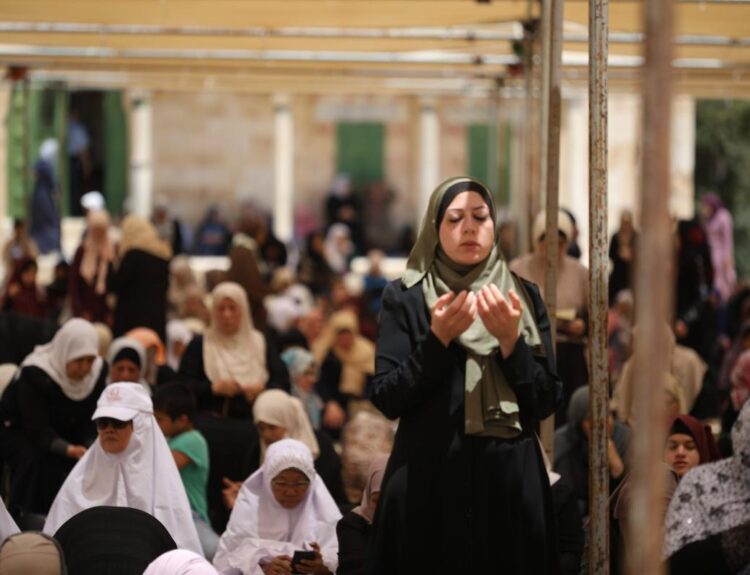Salah, the five daily prayers, is the second pillar of Islam, a sacred act that connects Muslims to Allah and brings peace to their hearts. Achieving perfect Salah requires khash (concentration and humility), which deepens its spiritual impact. The Holy Quran and the Sunnah of Prophet Muhammad (PBUH) offer timeless guidance on enhancing focus in prayer.
Understanding Salah and the Need for Focus
What Is Salah?
Salah is a ritual prayer performed five times daily, involving specific movements and recitations. It is a direct link to Allah, requiring presence of heart. The Quran emphasizes its importance:
Surah Al-Baqarah, Ayah 43
وَأَقِیمُوا۟ ٱلصَّلَوٰةَ وَءَاتُوا۟ ٱلزَّكَوٰةَ وَٱرۡكَعُوا۟ مَعَ ٱلرَّ ٰكِعِینَ
And establish prayer and give zakah and bow with those who bow [in worship and obedience].
[2:43]
This verse underscores Salah as a communal and spiritual duty.
Why Focus Matters
The Prophet (PBUH) said, “The first thing for which a person will be brought to account on the Day of Resurrection is his prayer. If it is sound, then the rest of his deeds will be sound” (Sunan an-Nasa’i, Hadith 466). Khush ensures Salah is meaningful, not mechanical, maximizing its rewards.
Tip 1: Prepare Mentally Before Salah
Set Your Intention
Clear your mind and intend to pray solely for Allah. The Quran says:
Surah Al-An’am, Ayah 162
قُلۡ إِنَّ صَلَاتِی وَنُسُكِی وَمَحۡیَایَ وَمَمَاتِی لِلَّهِ رَبِّ ٱلۡعَـٰلَمِینَ
Say, “Indeed, my prayer, my rites of sacrifice, my living and my dying are for Allah, Lord of the worlds.
[6:162]
This verse reminds us to dedicate Salah to Allah.
Practical Example
Before Fajr, a student might sit quietly, saying, “I pray for Allah’s pleasure,” clearing distractions.
Tip 2: Perform Wudu with Mindfulness
Purify with Purpose
Wudu (ablution) cleanses physically and spiritually, preparing you for Salah. The Prophet (PBUH) said, “When a Muslim performs Wudu, his sins are washed away from his body” (Sahih Muslim, Hadith 223).
Practical Tip
Focus on each step of Wudu, reciting duas, like “Ashhadu an la ilaha illallah” after completion. A teacher might reflect on cleansing their heart while washing their face.
Tip 3: Choose a Quiet, Clean Space
Create a Sacred Environment
A distraction-free space enhances focus. The Quran praises clean worship spaces:
Surah An-Nur, Ayah 36
فِی بُیُوتٍ أَذِنَ ٱللَّهُ أَن تُرۡفَعَ وَیُذۡكَرَ فِیهَا ٱسۡمُهُۥ یُسَبِّحُ لَهُۥ فِیهَا بِٱلۡغُدُوِّ وَٱلۡـَٔاصَالِ
[Such niches are] in mosques which Allah has ordered to be raised and that His name be mentioned therein; exalting Him within them in the morning and the evenings
[24:36]
Example
A parent praying in a tidy corner at home, free from noise, feels closer to Allah, mirroring the Prophet’s (PBUH) practice in his mosque.
Tip 4: Understand the Meanings of Recitations
Connect with the Words
Learn the meanings of Surahs and supplications to deepen engagement. The Quran encourages reflection:
Surah Sad, Ayah 29
كِتَـٰبٌ أَنزَلۡنَـٰهُ إِلَیۡكَ مُبَـٰرَكࣱ لِّیَدَّبَّرُوۤا۟ ءَایَـٰتِهِۦ وَلِیَتَذَكَّرَ أُو۟لُوا۟ ٱلۡأَلۡبَـٰبِ
[This is] a blessed Book which We have revealed to you, [O Muhammad], that they might reflect upon its verses and that those of understanding would be reminded.
[38:29]
Practical Tip
Study Surah Al-Fatiha’s translation. A worker reciting “Guide us to the straight path” might ponder seeking Allah’s guidance daily.
Tip 5: Visualize Standing Before Allah
Feel Allah’s Presence
Imagine Allah watching you, fostering humility. The Prophet (PBUH) said, “Pray as if you see Allah, and if you cannot, know that He sees you” (Sahih Bukhari, Hadith 50).
Example
A student picturing Allah’s mercy during Sujood feels awe, enhancing their focus, as Umar (RA) did in his prayers.
Tip 6: Recite Slowly and Deliberately
Avoid Rushing
Slow recitation allows mindfulness. The Quran advises measured recitation:
Surah Al-Muzzammil, Ayah 4
أَوۡ زِدۡ عَلَیۡهِ وَرَتِّلِ ٱلۡقُرۡءَانَ تَرۡتِیلًا
Or add to it, and recite the Qur’an with measured recitation.
[73:4]
Practical Tip
Pause after each verse in Surah Al-Ikhlas. A nurse praying Dhuhr slowly feels each word’s weight, improving khush.
Tip 7: Minimize Distractions
Guard Your Focus
Avoid external and internal distractions, like phones or wandering thoughts. The Prophet (PBUH) advised, “When you stand for prayer, perform it as if it is your last” (Sunan Ibn Majah, Hadith 4171).
Example
A parent silencing their phone before Maghrib prays undisturbed, emulating Fatima’s (RA) focused worship.
Tip 8: Make Dua for Better Focus
Seek Allah’s Help
Ask Allah to grant khush in Salah. The Quran encourages supplication:
Surah Ghafir, Ayah 60
وَقَالَ رَبُّكُمُ ٱدۡعُونِیۤ أَسۡتَجِبۡ لَكُمۡۚ إِنَّ ٱلَّذِینَ یَسۡتَكۡبِرُونَ عَنۡ عِبَادَتِی سَیَدۡخُلُونَ جَهَنَّمَ دَاخِرِینَ
And your Lord says, “Call upon Me; I will respond to you.” Indeed, those who disdain My worship will enter Hell [rendered] contemptible.
[40:60]
Practical Tip
Before Salah, say, “O Allah, help me focus.” A student making this dua notices improved concentration over time.
Tip 9: Reflect After Salah
Evaluate Your Prayer
Assess your focus post-Salah to improve future prayers. The Quran urges self-reflection:
Surah Al-Hashr, Ayah 18
یَـٰۤأَیُّهَا ٱلَّذِینَ ءَامَنُوا۟ ٱتَّقُوا۟ ٱللَّهَ وَلۡتَنظُرۡ نَفۡسࣱ مَّا قَدَّمَتۡ لِغَدࣲۖ وَٱتَّقُوا۟ ٱللَّهَۚ إِنَّ ٱللَّهَ خَبِیرُۢ بِمَا تَعۡمَلُونَ
O you who have believed, fear Allah. And let every soul look to what it has put forth for tomorrow – and fear Allah. Indeed, Allah is Acquainted with what you do.
[59:18]
Example
A professional noting distractions after Isha resolves to recite slower next time, growing in mindfulness.
Tip 10: Be Consistent and Patient
Build a Habit
Consistent Salah with gradual improvement leads to perfection. The Prophet (PBUH) said, “The most beloved deeds to Allah are those done consistently, even if small” (Sahih Bukhari, Hadith 6465).
Practical Tip
Commit to one tip daily, like slow recitation, and be patient. A new Muslim practicing regularly sees their focus strengthen, inspired by Bilal’s (RA) steadfast prayers.
Addressing Common Challenges
Challenge 1: Wandering Thoughts
Distractions are common. Solution: Refocus by reciting “A’udhu billahi min ash-shaytan ir-rajim” and visualize Allah.
Challenge 2: Time Constraints
Busy schedules hinder focus. Solution: Pray on time, even briefly, as the Prophet (PBUH) prioritized Salah (Sahih Muslim, Hadith 85).
Misconception: Perfect Salah Is Unattainable
Khush improves with effort, not perfection. The Quran encourages striving (Surah Al-Baqarah, Ayah 43).
Misconception: Only Scholars Achieve Focus
All Muslims can enhance Salah with practice, as Abu Bakr (RA) did through sincerity (Sahih Bukhari, Hadith 121).
Practical Steps to Start Today
- Choose One Tip: Start with slow recitation or Wudu mindfulness.
- Learn Meanings: Study one Surah’s translation weekly.
- Set Reminders: Use apps for Salah times and duas.
- Join a Community: Pray in congregation at a mosque.
- Track Progress: Note improvements in a prayer journal.
Conclusion: Perfecting Salah for a Closer Connection to Allah
Perfecting your Salah through these 10 tips—mental preparation, mindful Wudu, clean space, understanding recitations, visualizing Allah, slow recitation, minimizing distractions, dua, reflection, and consistency—transforms prayer into a deeply spiritual act. Rooted in the Quran and Hadith, these practices, exemplified by the Companions (RA), strengthen your bond with Allah. By focusing on khush, you elevate your worship and life. Let this guide inspire you to perfect your Salah in 2025, drawing closer to Allah with every prayer.







